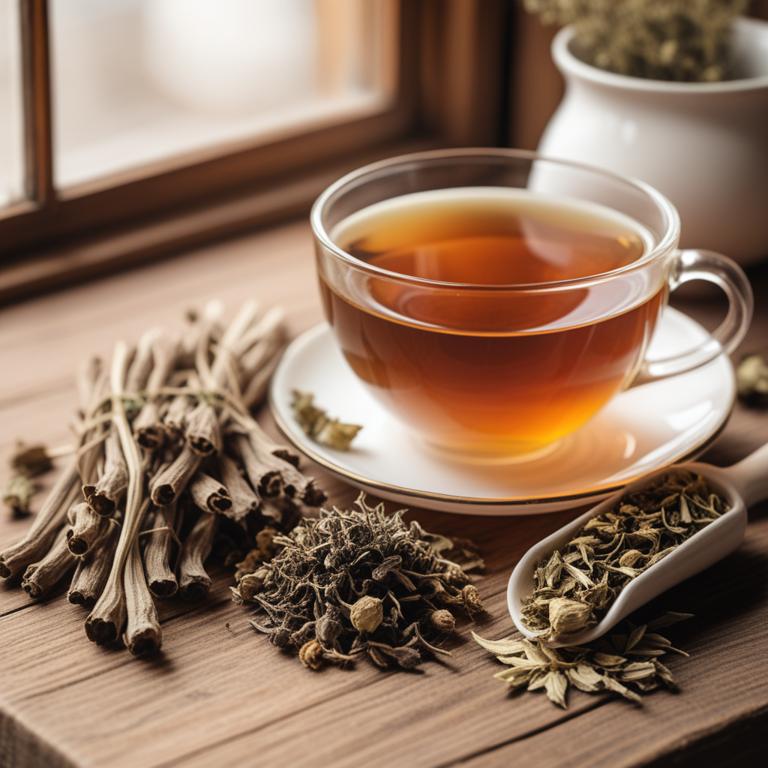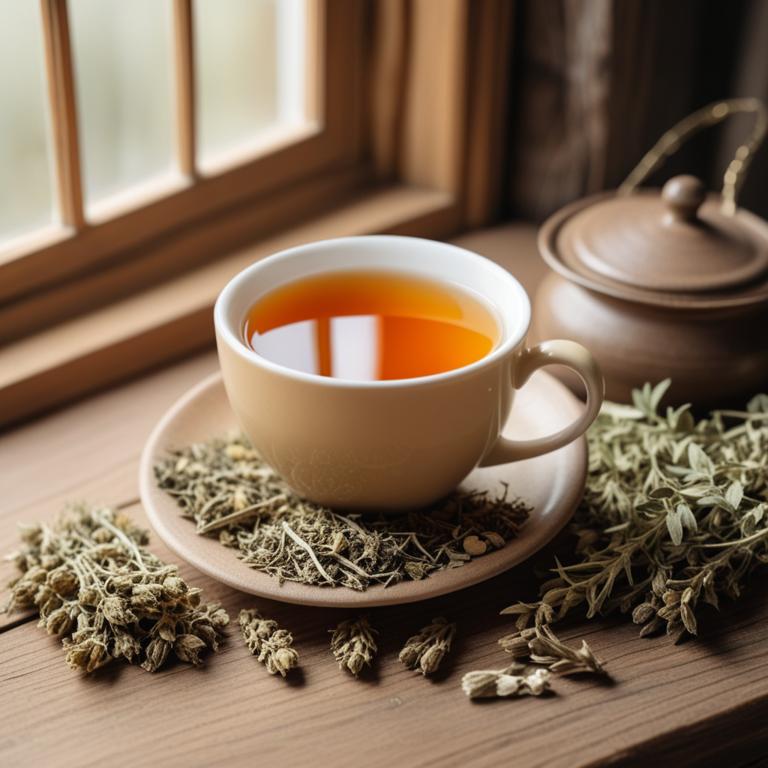7 Herbal Teas For Rheumatoid Arthritis

Herbal teas have been used for centuries to help manage the symptoms of rheumatoid arthritis.
This condition causes inflammation and pain in the joints, making everyday activities a challenge. Herbal teas can help relieve these symptoms by reducing inflammation and promoting relaxation. One example of an effective herbal tea is Curcuma longa, also known as turmeric tea. Curcuma longa contains a compound called curcumin, which has potent anti-inflammatory properties. This helps to reduce joint pain and swelling, making it easier to move around.
Another herb that can help is Zingiber officinale, or ginger tea. Ginger has anti-inflammatory properties that can help reduce pain and stiffness in the joints. Glycyrrhiza glabra, or licorice root tea, is another herbal tea that can help with rheumatoid arthritis. Glycyrrhizin, a compound found in licorice root, has anti-inflammatory properties that can help reduce joint pain and swelling. When you drink herbal teas like these, they help to reduce inflammation and promote relaxation, making it easier to manage the symptoms of rheumatoid arthritis.
This can help you feel more comfortable and confident in your daily activities, allowing you to live a more active and fulfilling life.
- 1. Curcuma longa
- 2. Zingiber officinale
- 3. Glycyrrhiza glabra
- 4. Ginkgo biloba
- 5. Withania somnifera
- 6. Cinchona officinalis
- 7. Rheum officinale
1. Curcuma longa

Curcuma longa teas contains a powerful compound called curcumin, which is responsible for its medicinal properties.
Curcumin is a potent anti-inflammatory agent that helps reduce joint pain and swelling associated with rheumatoid arthritis. This is due to its ability to inhibit the production of pro-inflammatory enzymes, such as COX-2 and LOX, which contribute to inflammation. Additionally, curcuma longa teas contains other bioactive constituents like demethoxycurcumin and bisdemethoxycurcumin, which have been shown to have antioxidant and anti-inflammatory effects.
By reducing inflammation and oxidative stress, curcuma longa teas can help alleviate symptoms of rheumatoid arthritis and improve quality of life.
- Gather 1 tablespoon of dried Turmeric root powder and 1 cup of boiling water.
- Add 1 tablespoon of honey or sugar to taste, if desired, to your cup.
- Add the Turmeric root powder to the boiling water and stir well.
- Let the mixture steep for 5-7 minutes to allow the Curcuma longa to infuse.
- Strain the tea into a cup and drink while warm, 2-3 times a day for relief.
2. Zingiber officinale

Zingiber officinale teas contains bioactive constituents like gingerols and shogaols, which have potent anti-inflammatory properties.
These compounds inhibit the production of pro-inflammatory enzymes, reducing swelling and pain in joints affected by rheumatoid arthritis. Ginger's ability to block prostaglandins, hormone-like substances that cause pain and inflammation, also contributes to its therapeutic effects. Furthermore, ginger's antioxidant properties help protect the body from oxidative stress, which can exacerbate arthritis symptoms.
By reducing inflammation and oxidative stress, Zingiber officinale teas can help alleviate the symptoms of rheumatoid arthritis.
- Gather 1 cup of fresh or dried Zingiber officinale roots.
- Cut 1-2 inches of the roots into small pieces and place them in a saucepan.
- Add 2 cups of water to the saucepan and bring to a boil.
- Reduce heat and let it simmer for 5-7 minutes, then strain the mixture.
- Drink 1 cup of the Zingiber officinale tea, 2-3 times a day, to help manage rheumatoid arthritis symptoms.
Zingiber Officinale Tea on Amazon
FGO Organic Ginger Tea, 100 Count, Eco-Conscious Tea Bags, Caffeine Free, Packaging May Vary (Pack of 1)
Disclaimer: We earn a commission if you click this link and make a purchase at no additional cost to you.
3. Glycyrrhiza glabra

Glycyrrhiza glabra teas contains bioactive constituents like glycyrrhizin and flavonoids.
Glycyrrhizin reduces inflammation and swelling in the joints, which helps to relieve pain associated with rheumatoid arthritis. The flavonoids in the tea have antioxidant properties, which help to protect the joints from damage caused by free radicals. The anti-inflammatory and antioxidant properties of Glycyrrhiza glabra teas help to reduce the severity of rheumatoid arthritis symptoms.
The tea's bioactive constituents may interact with the body's natural processes to reduce joint inflammation and promote overall well-being.
- Gather 2 tablespoons of dried Glycyrrhiza glabra root and 1 cup of water.
- Boil the water in a pot and add the dried root. Let it steep for 5-7 minutes.
- Strain the tea into a cup using a fine mesh sieve or cheesecloth.
- Add honey to taste, if needed. Some people find the tea bitter.
- Drink the tea 2-3 times a day to help manage rheumatoid arthritis symptoms.
4. Ginkgo biloba

Ginkgo biloba teas contains flavonoids, bilobalide, and ginkgolides as its active constituents.
These compounds have anti-inflammatory properties, which help reduce swelling and pain associated with rheumatoid arthritis. The flavonoids in Ginkgo biloba also have antioxidant properties, protecting joints from damage caused by free radicals. The anti-inflammatory effects of Ginkgo biloba's ginkgolides help block the production of pro-inflammatory chemicals, which contribute to joint pain and inflammation.
By reducing inflammation and oxidative stress, Ginkgo biloba teas may help alleviate symptoms of rheumatoid arthritis, such as joint pain and stiffness.
- Gather 1 cup of boiling water and 1 tablespoon of dried Ginkgo biloba leaves.
- Measure 1 teaspoon of dried Ginkgo biloba leaves and place them in a tea infuser or a small muslin bag.
- Pour the boiling water over the Ginkgo biloba leaves in the tea infuser or muslin bag.
- Steep the mixture for 5-7 minutes, then remove the tea infuser or muslin bag from the cup.
- Strain the tea into another cup and discard the solids. Drink the tea 2-3 times a day.
5. Withania somnifera

Withania somnifera teas contains bioactive constituents like withanolides and alkaloids, which help reduce inflammation and pain associated with rheumatoid arthritis.
Withanolides have anti-inflammatory and antioxidant properties, which combat the free radicals that cause tissue damage and joint pain. Alkaloids in the tea, such as withaferin A, have immunomodulatory effects, helping to regulate the immune system and reduce inflammation. The tea's anti-inflammatory properties also help to reduce joint swelling and stiffness, making it easier to move and perform daily activities.
By reducing inflammation and pain, Withania somnifera teas can provide relief for people with rheumatoid arthritis.
- Gather 1 cup of dried Withania somnifera roots and 1 cup of water.
- Boil the water in a pot and then turn off the heat.
- Add 2-3 tablespoons of dried Withania somnifera roots to the hot water.
- Steep for 5-7 minutes, then strain the tea into a cup.
- Drink 1-2 cups of the tea, 2-3 times a day, to help manage rheumatoid arthritis symptoms.
6. Cinchona officinalis

Cinchona officinalis teas contains alkaloids like quinine and quinidine, which have anti-inflammatory properties.
These compounds help reduce swelling and pain in the joints, a major symptom of rheumatoid arthritis. The alkaloids in Cinchona officinalis also have antioxidant properties, which help protect the body from cell damage and promote healing. Additionally, Cinchona officinalis contains kaempferol, a flavonoid with anti-inflammatory and antioxidant properties that may help reduce joint inflammation and pain.
By reducing inflammation and promoting healing, Cinchona officinalis teas may help alleviate symptoms of rheumatoid arthritis.
- Gather 2 teaspoons of dried Cinchona officinalis bark and a cup of boiling water.
- Steep the Cinchona officinalis bark in the boiling water for 5-7 minutes.
- Strain the mixture through a fine-mesh sieve into a cup.
- Add 1 tablespoon of honey to the tea, if desired, to sweeten the flavor.
- Drink the tea 2-3 times a day, as needed, to help manage rheumatoid arthritis symptoms.
7. Rheum officinale

Rheum officinale teas contains bioactive constituents like rhein and emodin, which have anti-inflammatory properties.
These properties help reduce swelling and pain in the joints, making it easier to manage rheumatoid arthritis symptoms. Rhein also has antioxidant properties that protect cells from damage caused by free radicals, which can contribute to joint inflammation. Emodin has been shown to inhibit the production of pro-inflammatory enzymes, further reducing joint inflammation and pain.
By drinking Rheum officinale teas, people with rheumatoid arthritis may experience relief from joint pain and inflammation.
- Gather 2 tablespoons of dried Rheum officinale root.
- Boil 1 cup of water in a teapot.
- Add the 2 tablespoons of Rheum officinale root to the boiling water.
- Reduce heat and let it steep for 5-7 minutes.
- Strain the liquid and drink the tea while it's warm.